Intel X58 Motherboard Roundup - What does $300 Get You?
by Gary Key on December 5, 2008 3:00 PM EST- Posted in
- Motherboards
SATA Performance
PCMark Vantage is the latest benchmark available from Futuremark, and it is only for use with Windows Vista. Similar to the venerable PCMark05 in its makeup, Vantage modernizes the criteria and test methodology to reflect what users may encounter when running the new Windows OS and current applications. The total HDD benchmark is roughly 87% reads and 13% writes in nature. We run each test five times per drive, producing a median score that we use for comparison in our charts. We utilize AHCI settings for each board.
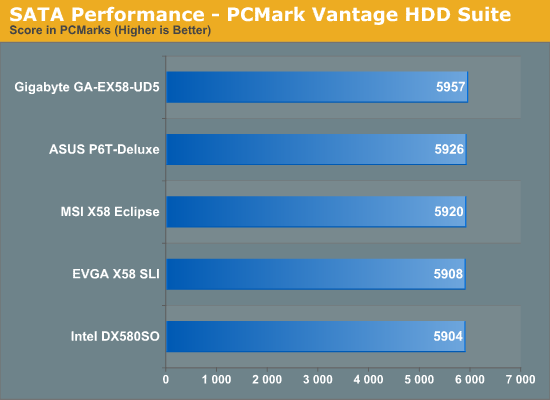
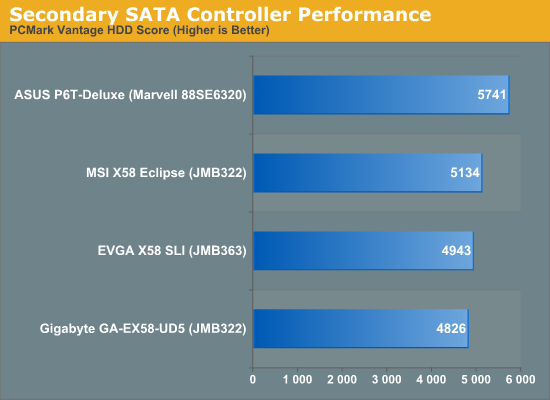
All of the boards utilize the ICH10R for primary storage duties, so there is little difference between the results. In our secondary controller results, we see the SAS solution from Marvell leading the JMicron controllers utilized on the other boards. The MSI and Gigabyte boards both utilize the JMB322 chipset, but we see the MSI board performing better since the JMB322 resides directly on the PCIe bus instead of utilizing the JMB363 as a pass through chip in the same manner that Gigabyte does. EVGA uses the JMB363 chipset and it just barely slides past the Gigabyte setup.
USB / FireWire Performance
Our USB transfer speed tests are conducted with an OCZ Rally 2 Turbo 4GB Flash Drive and USB 2.0/FireWire based Maxtor OneTouch II external hard drive. In the small file test, we transfer a 602MB file folder containing 444 files of various sizes from our hard drive to the USB Flash drive. In the large file test, we transfer a 1.90GB file folder containing 17 different files from our hard drive to the external drive utilizing the USB 2.0 and IEEE 1394a interface.
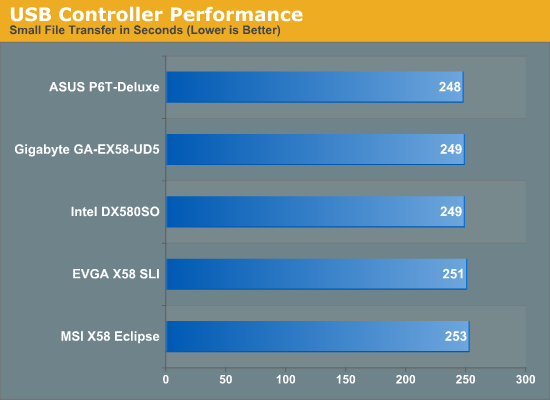
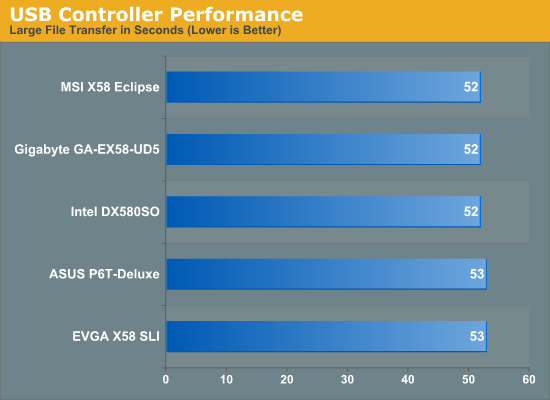
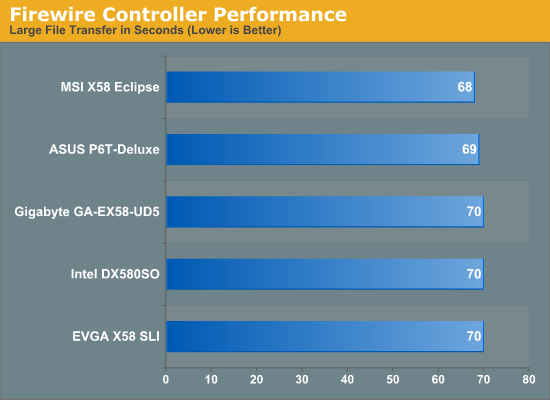
USB performance should be a wash since all the boards use the same ICH10R chipset that provides the USB capabilities. While our synthetic HD Tune tests indicate parity between the boards, the actual transfer of files in the small file test indicates a slight advantage to the ASUS, Gigabyte, and Intel implementations. Our large file USB test is basically a wash as the external hard drive becomes the limiting factor. The VIA FireWire solution on the MSI and ASUS boards hold a small advantage over the Texas Instruments chipset on the other boards.
Networking
The Windows 2000 Driver Development Kit (DDK) includes a useful LAN testing utility called NTttcp. We used the NTttcp tool to test Ethernet throughput and the CPU utilization of the various Ethernet Controllers used on the Intel motherboards. We set up one machine as the server; in this test, an Intel system with an Intel CSA Gigabit LAN connection. Intel CSA has a reputation for providing fast throughput and is a logical choice for our Gigabit LAN server.
On the server side, we used the following Command Line as suggested by the VIA whitepaper on LAN testing:
Ntttcpr -m 4,0,‹server IP› -a 4 -l 256000 -n 30000
On the client side (the motherboard under test), we used the following Command Line:
Ntttcps -m 4,0,‹client IP› -a 4 -l 256000 -n 30000
At the conclusion of the test, we captured the throughput and CPU utilization figures from the client screen.
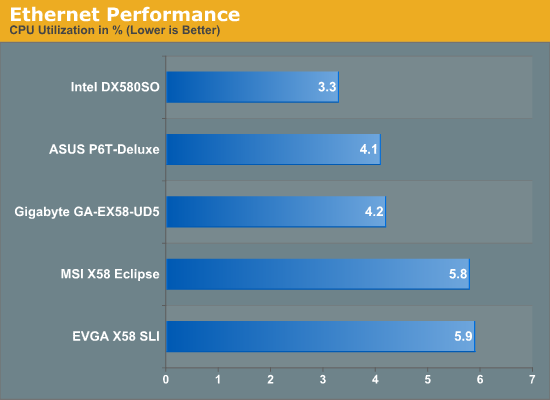
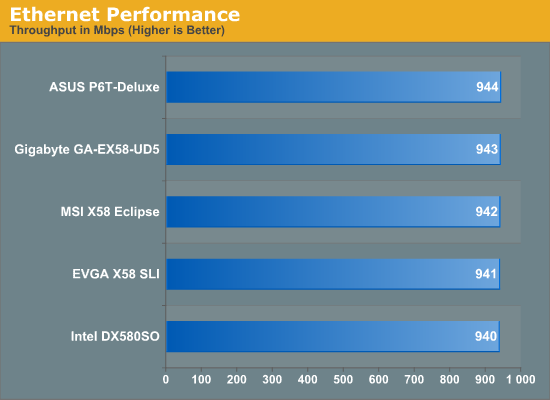
Our network throughput test indicates how well a particular controller design from Realtek, Marvell, or Intel performs instead of being indicative of true chipset performance. This also holds true for the CPU utilization results, though this test can also be influenced to certain degree by the BIOS code and chipset interconnect design.
The CPU utilization numbers favor the integrated GbE controller on the Intel board, followed closely by the Marvell chipset on the ASUS board. The EVGA, MSI, and Gigabyte boards use similar Realtek networking chips, but the Gigabyte board uses the newer RTL8111D over the MSI/EVGA RTL8111Cs. All of the boards feature excellent throughput, with the Marvell solution edging slightly ahead of the Realtek and Intel solutions.










78 Comments
View All Comments
Zak - Saturday, December 6, 2008 - link
I still had working PII and PIII mobos that I trashed this year, not because they were bad but because these platforms were outdated. These mobos still worked 100% after what 7-8 years??? Each mobo I bough within the last 3-4 years never lasted more than 2 years without some major malfunction (some controller dying, memory slots failing, etc). The boards are getting more expensive and less reliable. There is an obsession with overclocking without any effort to offer perfect stability. Most users want a good balance of speed and stability, and as we all know one isn't any good without the other. Besides, overclocking yields minimal real life gains, unless you do something really extreme, and how many people do extreme overclocking??? Mobo makers should focus on stability and features first. Eh...We live in beta culture:(Z.
Griswold - Saturday, December 6, 2008 - link
What does AT get for being a quasi outsourced QA branch of these mobo manufacturers? To me it looks like you're being taken advantage of - its great that you work with them to get stuff fixed, but is there any compensation for the time invested other than the good feeling?Syntience - Saturday, December 6, 2008 - link
Some of us have non-parallelizable applications (in our case, a certain kind of AI research) that require vast amounts of memory but don't require that much in the way of processing power. We buy the motherboards with the highest number of memory slots and fill those up with the largest memory modules we can reasonably afford. At the moment (late 2008) that means 4GB DDR2 modules. Boards like SuperMicro H8QMi-2+ have 32 DIMM sockets on the motherboard which means our current sweet spot is 128GB.We expect motherboards to operate in these fully loaded configurations, and so far we've been quite lucky. But we'd appreciate manufacturers and reviewers consistently testing boards in whatever max memory capacity the manufacturer is advertising.
Incidentally, we'd like to see motherboard manufacturers produce systems with DIMM sockets on daughter boards that could be stacked to some depth for even more memory, or even return to backplane/bus based designs with multiple separate memory boards. I don't know whether this is economically feasible to do with current memory interface chip sets. It clearly is possible, since these kinds of systems are available in the turnkey server market.
- Monica
LTG - Saturday, December 6, 2008 - link
What you guys are doing is outstanding and exactly the right thing.What's the saying, sunshine is the best disinfectant?
That's what manufacturers need - as much light as possible shown on their quality and stability issues.
Let the best companies reap the rewards just as the top automakers do with their reliability measures.
DaveLessnau - Saturday, December 6, 2008 - link
The reason manufacturers have thrown reliability, stability, and maintainability (i.e., Quality) out the window is because of the way the review sites review their products. Back in the day, places like PC Magazine would do yearly articles that talked about which manufacturer produced, essentially, the highest quality products. Try to find something like that today. If a board doesn't have glowing fins, can't overclock to a bajillion GHz, use a terabyte of RAM, run 27 video cards in tandem, have every doodad imaginable stuck onto it, roar like a jet-engine because of the cooling requirements, and require a KW-level power supply, the review sites don't even cover it (I'm using an Intel DP45SG right now -- I double-dog dare you to find a review of it anywhere (I mean, it's only a fairly new board from the pre-eminent computer company on the planet)). Plus, every review automatically focuses on the over-clocking aspects of the boards. Overclocking is a fine thing to mention ONCE THE BASIC QUALITY OF THE BOARD AND THE COMPANY BEHIND IT HAS BEEN DETERMINED.For instance, this DP45SG. I bought it for two reasons: 1) it (supposedly) does exactly what I need it to do, and 2) Intel (supposedly) provides good support and reliable boards. There are no reviews out there because it's not an "enthusiast" board from an "enthusiast" company. So, I had to buy it blind. After setting it up, I found that (this is from my Newegg review):
"Under Vista Ultimate (x64), drives connected to the eSATA port on the back do not get recognized as external or removable after the machine has entered and exited sleep mode. Without having slept, there's no problem. I confirmed this with 3 separate drives in 2 external enclosures.
- The Dolby Control Center software doesn't exist in a 64-bit version. I searched Intel's site and the web in general and found nothing. Intel doesn't even know when there will be a 64-bit version.
- The Intel Desktop Control Center software isn't available for the current BIOS. According to the web site: "The current BIOS release for Intel Desktop Board DP45SG does not support the Intel Desktop Control Center. A new version of the Intel Desktop Control Center will be posted here when a compatible BIOS becomes available."
- The Intel Integrator Assistant software isn't available for 64-bit versions of either Vista or XP."
The first three of those bullets are some of the core things I needed. They're advertised for the board, but there are no reviews. So, no one knows about it.
Then, take a look at support. Intel just released a new BIOS for the board (0102). You can take a look at ABXZone in the Intel DP45SG (Skyburg) thread starting on page 38 for comments on this. In a nutshell, Intel released a BIOS that sets processor speeds and voltages wrong and killed SpeedStep if you just LOOKED at the processor settings. Granted, talking to their technical support was somewhat refreshing compared to other companies. But, finally, I (and others) reverted back to the previous BIOS.
The horrifying thing is that this has nowhere to go but down. None of the sites cover this kind of information. So, basic quality just continues to ebb while the companies put more and more focus on the trivial bells and whistles that the "enthusiast" sites focus on.
strikeback03 - Monday, December 8, 2008 - link
I'd guess the most basic answer is that they don't have enough man-hours available to do complete testing on every motherboard available. As far as I can tell, motherboard testing is done by Gary, with some help from Anand and possibly Raja. Guessing by the name of your board, it is a P45-based design. Looking at just ASUS site, they list 12 P45 boards, and based on previous ASUS experience there are probably more which just do not show up properly in the list. How long would it take one or two people to only check basic operation of the 12 listed boards? There are at least two relevant OSes to test under, Vista 32 and 64 bit. Do they test XP as well? Both 32 and 64 bit? How about any forms of Linux, again with both 32 and 64 bit? A previous commenter complained about a certain Logitech keyboard not working, just how many different peripherals should they keep around? And multiply this by however many boards all the other manufacturers have out, and get thm done in time to be relevant before the next chipset revision comes out? For free?As a result I imagine they pick only boards which stand out or they guess will bring the most traffic to the site. This ends up being the overclocking-friendly boards, some uATX boards, and some HTPC friendly boards it seems.
ATWindsor - Saturday, December 6, 2008 - link
Very nice that you focus on stability and things actually working, to many sites give our "recommended"-stmaps in an uncritical fashion even when boards work poorly. This makes the site even more excellent, Goog work!poohbear - Saturday, December 6, 2008 - link
why are u guys accomodating the mobo manufacturers?!?!?! i understand you're one of the bigger review sites, but seriously if the product doesnt work just say that in your review, dont even bother contacting their engineers for help cause they should've taken care of that before it was even released. I dont read your reviews to see who i have to call or where i have to look to get a certain feature on the mobo to work. I know i sure as hell won't be able to call Evga's engineer and ask for help when my $300 mobo doesnt work. Gimme a break. I just want to know if it works out of the box.I'm glad to hear u guys are now going buy a mobo off the shelf to review the same product we all get, but didnt u do that all along?!!? its pretty disturbing to think u have always been reviewing cherry picked products. i'll have to read your reviews with a grain of salt UNLESS you specifically state where you got the product from. Didnt it ever occur to you that the products the manufacturer sends to u might have been unfairly optimized??
thorgal73 - Saturday, December 6, 2008 - link
... motherboard makers that don't care about finishing their products before they come to the market, that is.A simple example is DFI, but lately even the tier 1 manufacturers are guilty of it. I personally pulled al lot of my hair out while reviewing the DFI X48-T3RS over at Madshrimps.be. I've spent 2 months on that one, before I had anything decent to write about, and even now the review feels incomplete.
Did any of you notice that there never was a DFI X48-T3RS review here at Anand ? There was a preview with the Corsair 2133 memory, but the promised review never made it. Now you understand why...
I can only side with Anand here that something needs to be done urgently. I myself am as sick and tired than any other reviewer to spend ages on a review, while having my boss at my back asking "what's taking so long" ;-) I agree with the opinion that unfinished boards do not deserve publication, problem is, no boards that we (reviewers) get in our hands are finished, as they're mostly rev. 1.0 (or worse) with very early biosses.
Only solution is waiting with the risk that other sites will beat you to the review, and your own review will barely surface on the web any more....
danger22 - Saturday, December 6, 2008 - link
you should refuse to publish articles with boards that don't work out of the box. why give them any publicity?